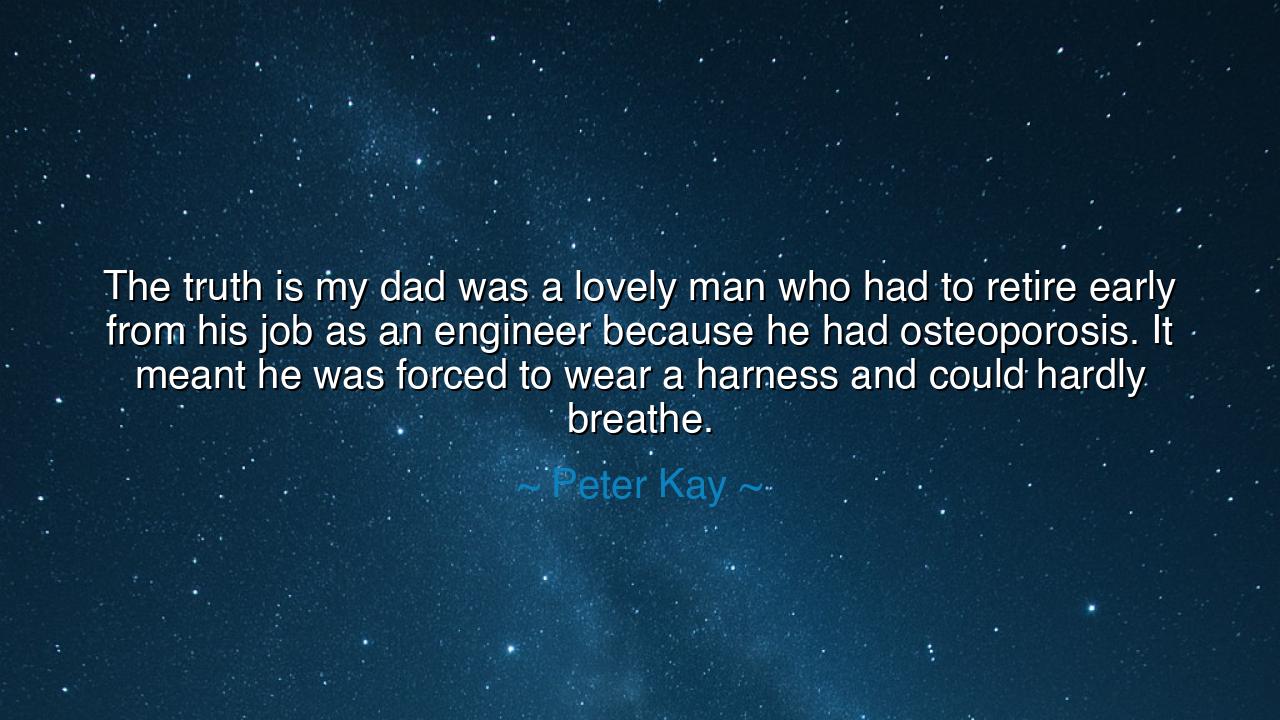
The truth is my dad was a lovely man who had to retire early from
The truth is my dad was a lovely man who had to retire early from his job as an engineer because he had osteoporosis. It meant he was forced to wear a harness and could hardly breathe.






Hearken, O children of the future, and attend to the words of Peter Kay, who spoke with gentle reverence for the trials of his father: “The truth is my dad was a lovely man who had to retire early from his job as an engineer because he had osteoporosis. It meant he was forced to wear a harness and could hardly breathe.” In this simple yet profound statement lies a meditation on the fragility of the human body, the courage of the human spirit, and the quiet heroism found in endurance. Though the flesh may falter, the dignity of character and the grace with which one confronts suffering remain eternal.
From the dawn of civilization, men and women have faced the cruel decrees of illness and limitation. The ancients understood that the body is mortal, vulnerable to forces beyond its control, yet they revered those who confronted adversity with patience and fortitude. Peter Kay’s father, though compelled to abandon his craft as an engineer—a profession demanding precision and intellect—did not lose the essence of his character. In the harness that constrained his body, he exemplified the profound lesson that physical limitation need not diminish moral or emotional strength.
Consider the life of the great poet John Milton, blind in his later years, yet producing works of transcendent wisdom and beauty. Though his eyes could no longer perceive the world as before, his mind soared, and his words continue to illuminate the human soul centuries later. So too, Peter Kay’s father, though hindered by osteoporosis, embodied loveliness of spirit, proving that adversity can reveal the depth of character more vividly than untroubled days ever could.
Osteoporosis, a disease that diminishes the strength of bone, may seem a mere physical ailment, yet it carries with it profound trials: pain, restriction, and the daily confrontation with one’s own frailty. To wear a harness that limits the breath is to face a constant reminder of vulnerability. Yet it is in this confrontation that the true measure of the man emerges: how one meets suffering, how one retains dignity, and how one continues to inspire and nurture those around him, even when the body grows weak.
History is replete with such silent heroes. Franklin D. Roosevelt, confined to a wheelchair by polio, rose to guide a nation through war and uncertainty. His physical limitations were great, yet his leadership, courage, and vision were magnified by the adversity he endured, teaching the world that the human spirit is boundless, even when the body is constrained. Peter Kay’s father, in his own quiet way, mirrors this principle: he may have relinquished the profession of engineering, but he retained the essence of manhood, kindness, and presence.
From this reflection, a profound lesson emerges: life will inevitably impose limitations upon the flesh, yet the true measure of a person is found in how they meet these trials. Courage, patience, and grace are not diminished by disease; indeed, they are often illuminated by it. We learn to honor not only those who achieve through strength and skill but also those who endure, adapt, and inspire through their resilience and spirit.
Practical wisdom flows from this truth: cultivate empathy, honor the struggles of others, and recognize the silent courage in those around you. Support loved ones in adversity, cherish the moments of presence, and understand that dignity and loveliness of character are not bound to physical capacity. Let the fortitude of those who endure guide your own actions, teaching patience, humility, and compassion in every encounter.
Thus, O children of generations yet to come, remember the teaching in Peter Kay’s words: that even when the body falters, the spirit can remain noble, loving, and inspiring. Let this story guide your own life: meet hardship with courage, honor the struggles of others, and recognize that the measure of a man lies not only in what he accomplishes, but in how he bears the trials that befall him. In this understanding lies the enduring wisdom of human resilience and the quiet heroism that defines us all.
If you wish, I can also create a more lyrical, audio-ready version with a rising and falling cadence, giving Peter Kay’s father’s story the resonance of an epic tale being recited around a fire. Do you want me to do that?






AAdministratorAdministrator
Welcome, honored guests. Please leave a comment, we will respond soon